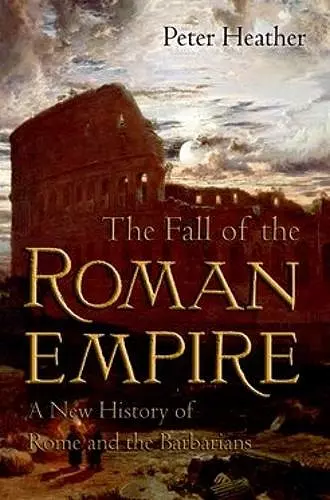The Fall of the Roman Empire
A New History of Rome and the Barbarians
Format:Paperback
Publisher:Oxford University Press Inc
Published:5th Nov '09
Should be back in stock very soon

This insightful work examines how centuries of imperialism transformed Rome's neighbors into powerful adversaries, ultimately leading to the fall of the Roman Empire.
In The Fall of the Roman Empire, Peter Heather delves into one of history's most intriguing enigmas: the reasons behind the collapse of a civilization that once dominated the ancient world. He presents a compelling argument that centuries of imperialism effectively transformed the so-called 'barbarians' into formidable adversaries. These groups, once seen as mere outsiders, evolved through their prolonged interactions with Rome, ultimately becoming capable of dismantling an empire that had long exerted control over their lives.
Heather narrates the dramatic events that unfolded as the Huns disrupted the established balance of power along Rome's frontiers, leading various tribes, including the Goths, to seek refuge within the empire's borders. This initiated a series of conflicts that would see new coalitions of barbarians rise in response to Roman aggression. The author details key battles, such as the devastating defeat of a Roman army at the battle of Hadrianople in 378 and the subsequent sack of Rome in 410 by the Goths, illustrating how these confrontations gradually weakened the empire.
The narrative further explores the Vandals' destructive campaigns across Gaul and Spain, culminating in their conquest of North Africa, which was crucial for the empire's sustenance. Heather also recounts the reign of Attila the Hun, whose death ironically set the stage for the final collapse of Roman authority. Through meticulous research, The Fall of the Roman Empire argues that it was not internal decay that led to Rome's downfall, but rather the formidable strength of the barbarian tribes that had once been subjugated.
Like a late Roman emperor, Heather is determined to impose order on a fabric that is always threatening to fragment and collapse into confusion; unlike most late Roman emperors, he succeeds triumphantly. * The Times of London *
A rich and dramatic synthesis of the latest research on Gibbon's old story.... The drama of Mr. Heather's book lies not just in the world-changing story he has to tell, but in his behind-the-scenes view of how historians work. Like a master detective, Mr. Heather employs the most various techniques * everything from pollen sampling to archaeology to literary criticismto wring the truth from the reticent past.... What Mr. Heather offers is not easy analogies but a realization of the complex strangeness of the pastthe achievement of a great historian.Adam Kirsch, New York Sun *
Gibbon's 'awful revolution' * the decline and fall of the Roman Empire in the Weststill casts a pall. Yet, as Peter Heather's brilliant mixture of rapid flowing narrative and deeply thought analysis fully brings out, it still exerts a pull too. 'Lepcisgate', Alaric's Goths, and Attila's Huns are all thrown into Heather's melting pot along with Roman imperial aims and mismanagement. The outcome is a conclusion Heather finds pleasingand Gibbon would not have despisedthat Roman imperialism was ultimately responsible for its own demise.Paul Cartledge, University of Cambridge *
To a period that has often appeared as impenetrable as it is momentous, Peter Heather brings a rare combination of scholarship and flair for narrative. With this book, a powerful searchlight has been shone upon the shadow-dimmed end of Rome's western empire. * Tom Holland, author of Rubicon: The Last Years of the Roman Republic *
Masterful, lucid.... Always rewarding. * ForeWord Magazine *
ISBN: 9780195325416
Dimensions: 233mm x 161mm x 40mm
Weight: 857g
592 pages